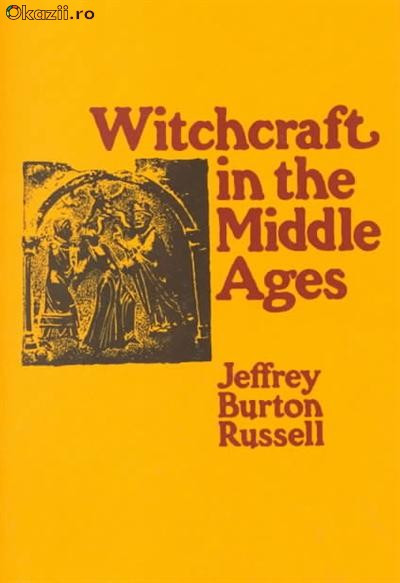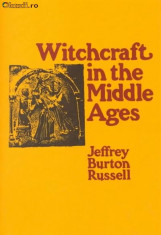Jeffrey Burton Russell - Vrajitoria in Evul Mediu European witchcraft Middle Ages vrajitorie medievala lucrare emblematica tematica
-
Produs:Second Hand, Fără garanție
-
Numar articol:54741306
-
Disponibilitate:Indisponibil
-
Preț:75,00 Lei
-
Anuntul a expirat la:29.05.2021, 23:17
-
Ai o nelamurire?
-
Vandut de:
-
Vinde si tu:Pune in vanzare un produs ca acesta
-
Optiuni:
Descriere
Vânzatorul este direct răspunzator pentru produsul afișat în această pagină.
Disponibilitate: Indisponibil - Vezi produse similare
Specificatii
Autor: Jeffrey Burton Russell
Titlu: Witchcraft in the Middle Ages
Editura: Cornell University Press
An aparitie: 1972
Nr. pagini: 394
Tip coperta: tare
Supracoperta
Invelitoare de protectie transparenta
starea cartii: foarte buna
Descriere: WITCHCRAFT IN THE MIDDLE AGES by Jeffrey Russell is a salient and well-written history about religious persecution during the Middle Ages involving individuals accused of the practice of "witchcraft". WITCHCRAFT was first published in the early 1970s when a renewed interest in the craft was gaining public attention. Adherents of the craft have suffered a severe and enduring persecution--worse than any other religious persecution--including that of the Jews. Even today, in an era when folks pat themselves on the back for their religious "tolerence" and/or secular outlook, "witchcraft" is still largely misunderstood. Even the name is a misnomer. Russell, who seems mostly objective, refers to the modern practice of "witchcraft" as "puerile" indicating he does not really understand the practice per se. Russell is not a participant-observer, he is an outsider examining in as objective a manner as possible events that transpired over a period of thousand years. He does not examine and order these events from the perspective of the practicioner being persecuted, he arranges them from the standpoint of the authories who now wonder what happened. Russell says currently there are four views extant in the West concerning "witchcraft" -- mainstream Roman Catholics, Protestants and Jewish groups pretty much ignore it; Fundamentalist Judeo-Christian groups see it as a "clear and present danger" and "the work of the devil"; Liberals see it as silly or sick behaviour ignorant church people persecute and mentally deranged and confused souls practice; Ethnographers describe "witchcraft" as worldwide and real, with devoted adherents. In the Middle Ages, the practice of "witchcraft" was associated with the diverse behaviors of various individuals or groups who for one reason or another found themselves on the wrong side of church law--first Roman Catholic and then Protestant Reformed. Russell says amazingly, individuals who participated in the Renaissance and Reformation, who overturned, destroyed, and abandoned many of the practices of the Church of Rome, retained the Catholic position on "witchcraft" and persecuted people suspected of the practice with a vengence unequaled by their predecessors. Russell examines the roots of the Chistian attitude toward witchcraft. He says that during the Babylonian captivity, when the Jews were cruelly carried off and enslaved, they came to accept the reality of evil. Through their efforts to understand and deal with evil, they accepted it must have a creator, i.e. a source. But how can a good God be the source of evil? Enter the devil. Russell says the dual thinking of the Jews (God and Satan--he provides many Biblical references to Satan--including the book of JOB), combined with the Greco-Roman belief in daemons (angelic entities who communicated with the gods) influenced thinking in the newly evolved Christian world. As the Church fathers grappled with folk beliefs that included Roman lares/penates and Celtic/Germanic Valkyries, fairies, elves and other supernatural folks, they came to believe Satan ruled all these magical creatures. During the Middle Ages, individuals punished for "witchcraft" (evil practicies associated with Satan) fell into a number of different categories. Russell attempts to tease these categories apart and determine what "witchcraft" was (the concept and definition changed over time) and who exactly engaged in the practices that came to be viewed as "witchcraft" (many people of diverse interest and background did many different things--or were accused of doing these things). Russell says for the most part, the church viewed individuals accused of "witchcraft" as heretics--i.e. engaged in non-church approved religious practices.
Modalitati de livrare si plata
LIVRARE
In Bucuresti
-
- Predare personala in max. 1 zi lucratoare
-
posta, ramburs
PLATA
- - La predare
Politica de retur
- - Produsul nu se poate returna.
Spune-ti parerea acordand o nota produsului




